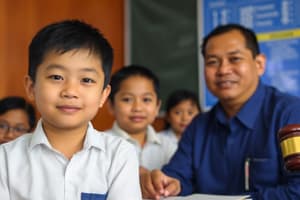Podcast
Questions and Answers
What term refers to the process of molding or training individuals in education?
What term refers to the process of molding or training individuals in education?
- Educare (correct)
- Educere
- Formal Education
- Socialization
Which function of education is primarily concerned with preparing individuals for their future occupational roles?
Which function of education is primarily concerned with preparing individuals for their future occupational roles?
- Cultural
- Social Integration
- Political
- Social Placement (correct)
What type of education is characterized by a specific curriculum and measurable learning outcomes?
What type of education is characterized by a specific curriculum and measurable learning outcomes?
- Experiential Education
- Formal Education (correct)
- Informal Education
- Non-formal Education
Which of the following best describes 'Latent Function' in the context of education?
Which of the following best describes 'Latent Function' in the context of education?
Which category of education focuses on civic attitudes and consciousness related to citizenship?
Which category of education focuses on civic attitudes and consciousness related to citizenship?
Which educational type is characterized by spontaneous learning through conversation and exploration?
Which educational type is characterized by spontaneous learning through conversation and exploration?
The transmission of culture and traditions falls under which function of education?
The transmission of culture and traditions falls under which function of education?
Madrasah education primarily aims to teach which of the following?
Madrasah education primarily aims to teach which of the following?
Study Notes
Education
-
Definition: The process of educating or being educated.
-
Etymology:
- Educare (Latin): to train or mold
- Educere (Latin): to lead out
-
Human and Constitutional Right: Guaranteed in the 1987 Philippine Constitution, Article XIV.
-
Department of Education (DepEd):
- Vision: "A learner-centered education system that is equitably accessible to all Filipinos."
- Mission: "To provide quality, equitable, relevant, and liberating education that will contribute to the development of a just and humane society."
- Values: DepEd's goals incorporate a strong emphasis on "Maka-Bayan", "Maka-Diyos," "Maka-Tao," and "Maka-Kalikasan."
Educational Institutions
-
Madrasah:
- A Muslim school that teaches Islamic values, the Islamic religion, and Arabic literacy.
-
IPEd (Indigenous People's Education):
- Designed for the Lumad (Indigenous Peoples) community.
Functions of Education
-
Socialization:
- Promoting healthy and proper social interaction for better community development.
-
Social Integration:
- Incorporating children into the society's structure, aligning with its cultural and traditional values.
-
Social Placement:
- Guiding individuals toward their occupational roles within society.
-
Social and Cultural Innovation:
- Fostering creativity and critical thinking to drive innovation.
Categories of Functions of Education
- Manifest Function: Intended outcomes of education.
- Latent Function: Unintended outcomes of education.
Functions of Education (Detailed)
-
Intellectual:
- Development of cognitive skills, critical thinking, and creative thinking.
-
Political:
- Cultivating civic attitudes, consciousness, and understanding of being a responsible citizen.
-
Social:
- Fostering interaction with others in various settings like families, schools, churches, and communities.
-
Economic:
- Preparing individuals for occupational roles and workforce participation.
-
Cultural:
- Transmission and preservation of cultural and traditional knowledge.
-
Educational:
- Evaluating the effectiveness of educational institutions in fulfilling their mission and objectives.
Types of Education
-
Formal Education:
- Structured learning with a defined curriculum, standardized content delivery, and formal assessments like tests, presentations, and research projects.
-
Informal Education:
- Spontaneous, conversational learning driven by exploration of experience.
- Can occur in any setting and aims to equip learners with tools for more advanced learning.
-
Non-formal Education:
- Organized educational activities outside of the formal education system.
Studying That Suits You
Use AI to generate personalized quizzes and flashcards to suit your learning preferences.
Related Documents
Description
This quiz explores the multifaceted concept of education, focusing on its definition, historical roots, and its significance as a human right in the Philippines. It highlights the vision and mission of the Department of Education, as well as unique educational institutions like Madrasah and Indigenous People's Education. Test your knowledge on these essential aspects of education.




